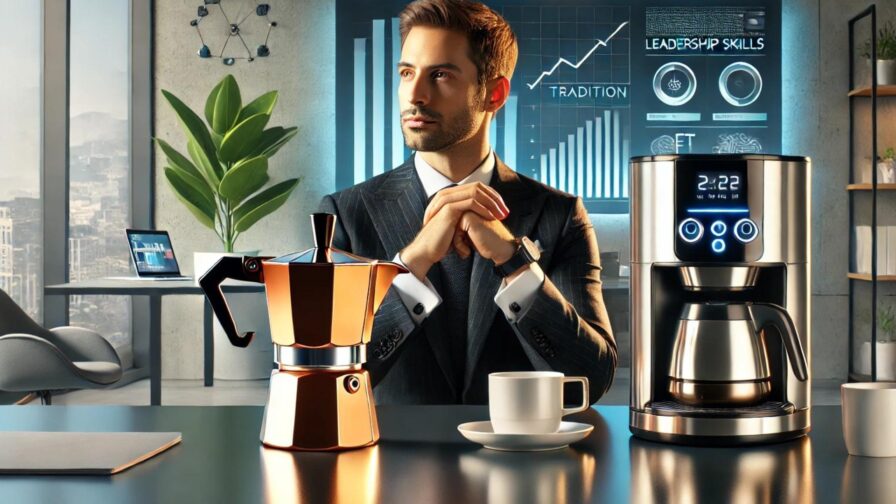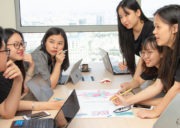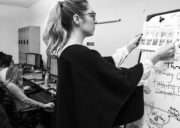
In the world of work, the success of a modern leader depends on a harmonious balance between soft skills and hard skills. Soft skills refer to relational, emotional, and communication abilities, while hard skills pertain to technical and specific expertise. An effective metaphor to understand this balance is the comparison between the moka – the classic coffee maker – and the electric coffee machine, symbolizing innovation and technology.
This metaphor helps illustrate how tradition and modernity, empathy and competence, can integrate to form a leader capable of guiding their team to success.
The moka: tradition, craftsmanship, and soft skills
The moka is an icon of Italian culture. Simple, reliable, and steeped in history, it requires a certain level of craftsmanship to brew the perfect cup of coffee. Its operation relies on the right balance of water, coffee, and heat, highlighting the human factor as crucial to its success.
How the moka represents soft akills
To prepare a great cup of coffee with the moka, you need to:
- Measure the coffee correctly – too little, and the coffee will be watery; too much, and it will be bitter.
- Control the flame – a flame that’s too high can burn the coffee, while one that’s too low prevents full extraction.
- Have patience – the coffee must brew slowly, without rushing.
These actions require attention, sensitivity, and adaptability – qualities that are essential for a leader’s soft skills.
Soft skills as the “art of the moka”
A leader with strong soft skills knows how to:
- Empathize with the team, listening to their needs and aspirations.
- Communicate effectively, delivering clear messages.
- Demonstrate flexibility, adapting to different situations.
- Exercise patience and resilience, acting at the right moment.
However, relying solely on soft skills can limit versatility in complex and technologically advanced contexts.
The electric coffee machine: technology, precision, and hard skills
The electric coffee machine embodies technological evolution. Equipped with advanced features, preset programs, and digital displays, it can brew a wide variety of beverages with precision and consistency.
How the electric coffee machine represents hard skills
To make the best use of an electric coffee machine, it’s important to:
- Know the functions – correctly set up the machine to achieve the desired result.
- Perform regular maintenance – clean the filters, replace worn-out parts, and ensure proper functioning.
- Leverage advanced technologies – customize the coffee according to preferences using digital functions.
These actions require technical competence, precision, and specific knowledge – the defining characteristics of a leader’s hard skills.
Hard skills as the “technology of the electric coffee machine”
A leader with strong hard skills knows how to:
- Apply technical expertise to achieve goals.
- Organize and plan efficiently.
- Innovate by using the most advanced technologies.
- Solve technical or operational problems quickly and effectively.
However, an exclusively technical approach can make the workplace feel cold and impersonal.
The perfect synergy: combining the moka and electric coffee machine
The secret to an exceptional cup of coffee – and effective leadership – doesn’t lie in choosing between the moka and the electric coffee machine, but in the ability to combine them complementarily. The best machines on the market integrate grinding and brewing into one seamless process, just as a successful leader balances soft skills and hard skills.
Strategies for integrating tradition and innovation
In a successful leader, tradition and innovation must coexist synergistically through some key strategies:
- Past and Future – value the past (experiences, values, relationships) while embracing progress (new technologies and advanced methodologies). Example: Implementing new software (hard skill) while maintaining empathetic communication (soft skill).
- Personalization and Standardization – adapt your leadership style to the needs of the team while keeping clear goals. Example: Understanding the diverse aspirations of a multi-generational team through a personalized approach.
- Efficiency and Humanity – balance speed and precision with empathy and emotional support. Example: During a crisis, optimize processes (hard skill) while supporting the team emotionally (soft skill).
Why this metaphor is relevant in today’s work environment
In today’s fast-paced world, marked by rapid changes, digitalization, and generational diversity, the metaphor of the moka and the electric coffee machine is especially relevant. In other words, a successful leader stands out for:
- Adaptability – they must know when to switch from the “moka” to the “electric coffee machine” based on the moment’s needs.
- Balance – the ideal mix of tradition and innovation is key to preparing the perfect “coffee” and guiding a team.
- Authenticity – while the moka represents humanity and authenticity, the electric coffee machine symbolizes efficiency and progress.
Conclusion: the leader as an “Expert Barista”
The true modern leader can be compared to an expert barista who knows how to use both the moka and the electric coffee machine. They blend traditional techniques and technological innovations, listening to their team and adapting their management style to the needs of every situation.
In a world where technical skills are crucial, the value of soft skills remains irreplaceable. Only through the perfect balance of soft and hard skills can a leader create a positive, productive, and motivating work environment.




